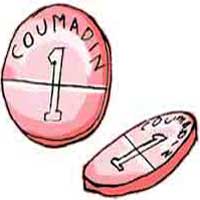“What Are The Side Effects of Coumadin?” Asks Elissa
By Adam Pick on July 23, 2009
Elissa was recently diagnosed with severe mitral regurgitation due to mitral valve prolapse.
In an email to me, Elissa writes, “Hi Adam – I’m going through the challenging process of picking a mechanical or tissue valve in case my valve can not be repaired. I know I’ll have to use Coumadin for the rest of my life if I go with a mechanical valve. Are there side effects of Coumadin that I should be aware of? If so, what are the common Coumadin side effects? Thanks for everything! Elissa”

Before answering Elissa’s question, I would encourage her (and perhaps you) to review a prior blog titled, “What Is Life Like On Coumadin?”. In the comments section of that blog, 20+ patients talk about their experiences of using Coumadin on a daily basis.
That said, the common side effects of Coumadin, according to MedicineNet, can be:
- nausea
- vomiting
- loss of appetite
- stomach/abdominal bloating or cramps
According to my research, most patients using Coumadin do not have very serious side effects. However, it should be noted that Coumadin can cause bleeding if its effect on your blood clotting proteins is too much (unusually high PT and INR results).
Also, please, please, please remember to tell your doctor immediately if any of these signs of serious bleeding occur:
- unusual pain/swelling/discomfort
- prolonged bleeding from cuts or gums
- persistent nosebleeds
- unusually heavy or prolonged menstrual flow
- unusual or easy bruising
- dark urine
- black stools
- severe headaches
- dizziness
I know that this listing of potential Coumadin side effects may be enough to sway you right to selecting a pig valve or a cow valve. However, remember that many patients do not experience these side effects. Still, I want to make sure Elissa (and you) are aware of the post-operative realities for patients with these types of valve replacements.
Keep on tickin!
Adam
|
Cliff Buehrer says on July 23rd, 2009 at 11:00 am |
|
Why don’t you consider repair of your mitral valve. That is what I did. No blood thinners required. Chose a qualified surgeon though!! Dr David Adams, Mt Sinai Hospital, NY, NY. May also want to consider Cleveland Clinic. Good Luck |
 |
|
Lisa says on July 23rd, 2009 at 11:43 am |
|
I agree, you may need to check with other surgeons to find one that can do the repair. I too had MVP with severe regurgitation, and both leaflets of the valve were badly damaged, a very difficult repair. My surgeon did the repair and I still have some regurg, my but in my opinion, at 36 years old, it is far better than having a valve replacement. My heart is performing much better than before. Good luck to you. Lisa |
 |
|
LAurie Collins says on July 23rd, 2009 at 1:38 pm |
|
Both my surgeon and cardiologist told me that they would avoid taking Coumadin if there is any way possible. They told me it causes complications as we age or if there is any type of unplanned trauma. That led me to look at the research that looked at the long term risks. I would have chosen a tissue valve the second time around if there had been that option. (They did too much reconstruction of the annulus and ascending aorta to connect a tissue valve.) Ask your doctor about the long term risks. It is a very important topic.The literature they hand us is overly simplified. |
 |
|
Dave Richards says on July 23rd, 2009 at 2:06 pm |
|
Elissa: If repair is possible, obviously that’s the way to go. However, if I were facing a replacement, there is no doubt that I would choose a mechanical valve. If I’m not mistaken, the failure rates for tissue valves could result in a reoperation in about 15 years. That is something I would have been unwilling to face. Today’s mechanical valves may last a lifetime and never have to be replaced. Unfortunately, as you know, coumadin therapy would be required. I was on coumadin immediately after my repair due to atrial fib. I experienced no side effects that I could pin on the coumadin specifically and I was on it for only eight weeks. Early on during the treatment, I was required to have at least weekly tests to check my blood’s PT/INR value. My doctor wanted me in the range between 1.7 and 2.3. Too high or low can result in problems. Once you get the dosing right and land in the range, you have to watch your diet and avoid foods that may interact with coumadin and lower its effect. Eventually, you can dial the tests back to every 2 to 4 weeks. You can usually arrange to have the test done at a diagnostic center local to you and some insurance companies will pay to have someone come to your home to draw your blood. It’s certainly a personal lifestyle choice. I wish you all the best. |
 |
|
Fran Zilko says on July 23rd, 2009 at 2:49 pm |
|
Have been on coumadin for 15 years due to A-fib. Will be having a valve replacement in the future. Have had no side effects and am maintained on a 2-3 INR range. Had been checked monthly but now have my own machine to use at home (paid for by Medicare) and I test weekly. Some meds will change the INR readings and we adjust dosage for that. Have never restricted my diet in any way and eating greens on a regular basis seems to not cause fluctuations. I am 70, so be encouraged to take coumadin if need be. |
 |
|
Bob Collins, Sr. says on July 23rd, 2009 at 4:39 pm |
|
Adam, I had my aortic valve replaced November 24, 1974. I was going to have a pig valve installed, but when I got to Birmingham for the surgery, Dr. John Kirkland, my Surgeon, decided to use a new valve, the Bjork Shirley (disk type) valve. This required me to take Coumadin every day. I have to have my blood tested (Protime and INR) on a regular basis. I have not had to deal with any side effects of taking Coumadin. My valve is a hand made valve, so I didn’t have any of the problems that they had when they started mass producing them. |
 |
|
Sean R. says on July 23rd, 2009 at 5:41 pm |
|
Elissa, |
 |
|
Neil Kortie says on July 23rd, 2009 at 6:15 pm |
|
Ellisa, |
 |
|
Sean R. says on July 23rd, 2009 at 10:00 pm |
|
Neil’s comments reminded me of how I respond to people who now ask (11 months after my surgery) if I’m “back to normal”. My answer is that I’m 120% better – that’s 100% recovered from the surgery plus an extra 20% better for no longer walking around with one chance in five each year of having a catastrophic cardiac event! |
 |
|
Astria Lackey says on July 23rd, 2009 at 11:55 pm |
|
I had open heart to replace badly damaged mitral valve one year ago-I have St. Jude mechanical valve and am on daily coumadin. This is something I now regret because I have had alot of complications from it. At first they could not get my blood thin enough, so now I am on 10 mg. a day. This had caused my blood to now be really thin, a 6. I had a bad fall 4 months ago walking my dog, which resulted in a very large abdominal hematoma from blood vessels ripping. At the time my level was 5.5. The second incident is also from gastric bleeding a month ago, where I lost 6 units of blood! Out of everything I have been through, that was the scariest! Docs are pretty sure about me having Lyme? It is hard to diagnose, and they say it makes it hard to regulate Coumadin levels because of me having Lyme. I know not everyone is like that, but I have heard stories. Just my experience. |
 |
|
Midge says on July 25th, 2009 at 4:20 pm |
|
I’m 67 and in Feb. of this year opted for a mechanical aortic valve, basing my decision on alot of web research. I knew I was in for a lifetime of coumadin but haven’t had any real problems with it (I forgot to take it one night, but was able to add it back to my weekly total by taking half tablets in addition to my regular dose for the next 3 days). Have had zero side affects. I expect to live a long life and did not want to face OHS again. For me, the risk of the tissue valve was enough to go mechanical. Yes, tissue valves are lasting longer and longer, but there are also enough incidences of them failing in the early years to make me content with my decision. Also, many people that have heart surgery (and alot who don’t even have surgery) end up on Coumadin for a-fib anyway. Also, I have a noiseless valve…have not heard if “click” once since I had it installed. Just wanted to get a word of support in for mechanical valves….they’re not bad for a life saver. But, PERSONAL CHOICE is the answer for each individual. |
 |
|
Meigs Matheson says on August 29th, 2009 at 4:56 pm |
|
Midge, |
 |
|
Midge says on August 30th, 2009 at 8:27 pm |
|
Meigs, now I’m a 68 yr old female and spent the day at Disneyland yesterday to celebrate….fun, fun, fun. I have a St. Jude’s valve and didn’t have a choice about which mechanical valve I got…the hospital just uses St. Jude’s. But they are the gold standard for mechanical valves. I could have chosen a tissue valve, of course, but did not want to go that route. Just hear on the news tonight that there is a new drug that may be able to replace Coumadin. They have been using and testing it in some European country and would, of course, need FDA approval. But Coumadin is not a bad drug and getting your blood drawn every 2- 3 weeks is not that bad. I belong to Kaiser HMO and their lab is open from 6 AM to 9 PM so not hard to get there. They also have a Coumadin Clinic that gets the results of your blood draw and then calls or mails you the dosage for the next 2-3 weeks. They are really pretty good at it….took about 3 months to get into a pretty level range but now is stays within the range most of the time. Based on what I had read and people I talked with personally, by phone or via other sites, the St. Jude’s valve is the way to go. And I truly did not want to be looking at another valve replacement when I was 80-85, which was my main reason for going mechanical. Believe me, this is one of the hardest decisions you will make in your life and you will go back and forth mechanical versus tissue many times each day, but eventually all the reading and searching begins to gel and you will be able to decide. My cardio was very happy I went with mechanical but did not try to sway me one way or the other. Midge |
 |
|
Greg says on September 21st, 2009 at 12:56 pm |
|
My dad had a St Jude Mitral valve replacement 18.5 years ago and he just past away at 81. I’m greatful to have had those 18.5 years with him. But along the way he did have issues and I tend to believe it had a lot to do with the cumiden. Mini strokes CTA’s: he would wake up and be totally out of it with short term memory issues and he eventually would be ok. Then the long term memory loss and evenually the dementia and alzheimer’s. My dad use to walk everyday but the dementia thing kind of stopped that. So if you can get away without taking blood thinners I would go that direction if its possible. Hopefully technology will make this an easy decision in the future. |
 |











